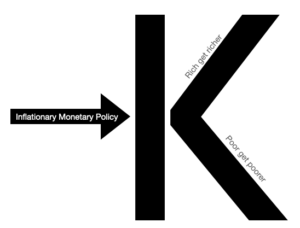
I’m reposting some of my thoughts from a blog comment discussion from last week.
I agree with the perspective that our currency should go back to being pegged to gold. This would force individuals, corporations, and governments to play by the same rules of economics. The side effect is that we wouldn’t really have bubbles and manias, there wouldn’t be as much real estate development and expansion (or “economic expansion” in general) because we would have a supply-side cap of money rather than an unlimited amount of money based on lending. We would be an asset-based society that rewards actual success rather than a debt-based society that builds its wealth by taking it from the people.
An asset-based society isn’t really wanted by many people who are wealthy thanks to debt. For instance, if you run a corporation that sells a product that people don’t have a strong desire or necessity for, then in an asset-based society you wouldn’t really sell them. In a debt-based society, people will buy your product using debt – by selling their future time simply because they don’t understand the true ramifications of their decision.
In an asset-based society, it’s much harder to start and run a successful business… the only products and services that will sell well are those that people want so much that they will buy them with their actual money. In a debt-based society, people just have to say “yes” to buy something. The decision itself is the form of payment. Unfortunately, that decision is also the forfeiture of future time in their life that could be spent doing enjoyable activities. Instead, the debt-funded “yes” sayer will be working with their future time because they have to in order to fulfill their “yes” obligations. The same concept applies to debts of government, but it’s the people who will pay the obligations through taxes and inflation.
Keep in mind, being “Pro-Dollar” may be anti-American. American principles include life, liberty, and the pursuit of happiness. Anything that interferes with our personal wealth is interfering with our liberty and pursuit of happiness. Consider becoming Pro-American exclusively. This means believing that if 300 million Americans were to pursue life, liberty, and the pursuit of happiness without monetary interference… the only losers would be bureaucrats and elitists.
If the dollars got sucked out of the US banking system, the banks would get crushed and individual wealth would be preserved. To leave dollars in the US banking is to crush individual wealth while preserving the banks. Once clearly grasped, it becomes a matter of recognizing whether your primary wealth position is one of being an individual or a bank. Then a simple, clear decision can be made whether to preserve your personal wealth or the banking system.
Don’t get distracted by the facade economy that everyone seems to be talking about – financial institutions. The real economy is personal wealth. If a Fortune 500 company crashes and you don’t own it, you aren’t affected. If the banking system implodes and you don’t own it or deposit in it, you aren’t affected. If all kinds of big companies and banks topple over, and we all have our personal wealth preserved, then the “real economy” (the wealth of the people) has been preserved. Each individual must make the choice between preserving the financial institution economy or the people’s economy. Indecision and inaction is a choice in itself that preserves the institutional economy rather than the people’s economy.
These are exciting times in that we have all been shaken up enough to think about protecting ourselves, our communities, our friends, and our families. We can thrive by returning to the principles that made us the world’s most powerful and wealthy country in the first place.


